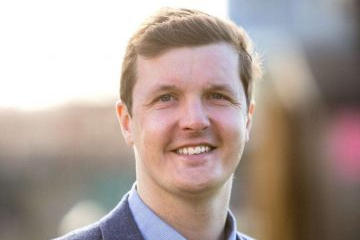Meet the man and business helping to corral the digital wild west

The internet has often been considered the wild west. But like the period it’s historically compared to, the challenges within it are the result of a period of great change.
Whether it’s the rise of drop shipping, social media stars or rapidly developing technology, the world wide web can be both a gift and a curse. Nowhere is this dichotomy more visible than in the area of mass communication.
Over the last eight weeks businesses and people have flocked online in greater numbers – stats show that internet usage for social media and communication has increased – with 21% of people spending more time on social media and 17% spending more time on messaging services such as WhatsApp.
However, with these changes to usage come risks. That’s where Leeds-headquartered Crisp come into things. The firm which was founded in 2004 by Adam Hildreth (he is also its CEO), describes itself as experts in “weaponised communication defence”. During a recent discussion with Hildreth he explained how they’d witnessed a rise in harmful attacks during the lockdown period; and went on to talk about the future and the importance of Yorkshire for talent.
Hildreth explained: “There are lots of reasons why people create harmful content. And if you think about what our job is, it is to make sure that we know about it first, before it spreads. The sooner you know about it, the sooner you can stop its spread very similar to the virus pandemic that we’re looking at today.”
The example he cites is Houseparty – an app which at the start of lockdown rapidly grew in popularity as a means to keep in-touch with family and friends. In fact the app saw a meteoric rise in downloads as the country entered lockdown – increasing by over 6,000% by 29 March to 91,776 UK downloads.
But the app suffered a catastrophic blow with rumours that it had been hacked and was opening its users up to malicious attacks. Hildreth states: “We [his family] used house party in the first week of lockdown, all our family did. I actually received a piece of news [about the service] and I deleted it off all the kids’ phones, my phone, everything! And it was fake, and someone had put that out. That’s how you destroy a company overnight, it literally went from a subscriber base going to millions upon millions of people to no one.
“It destroyed their business, and no one knows who was behind it,” he continues, “but it was absolutely the biggest disinformation campaign you’ve probably ever seen, killing what was essentially a start-up**.”
**Epic Games, the firm behind video game success Fortnite, purchased Houseparty in 2019 although Houseparty remains seperate.
In fact, the campaign has been so successful that Epic Games the parent company of the app, not only issued a denial of the claims but offered $1m reward to the first person that can prove there was a “paid commercial smear campaign” against Houseparty.
Hildreth highlights the scale of the issue: “Anyone can create any rumour. As long as it’s sort of newsworthy or people want to consume it, it will spread, and it will spread from all the groups that you’re in, on whatever messaging app you use, to different social media; and we all start to consume it. Unfortunately, those brands or the people that are involved will only get to find out about it until it is made headline news and at that point it’s too late”
“So, our goal at Crisp is to is to spot that spread”, Hildreth once again highlights the similarities between the programme of disinformation that exists online and that of the current pandemic. Stating: “Look at the pandemic issue, if someone could have predicted what was going to happen globally and got in there quickly and stopped the virus spreading. potentially thousands of lives could be saved. Similarly, how things spread online, there are millions of pieces of fake news created every day. Only a few of them spread, so if you can spot the ones that are spreading and predict what the impact is, and essentially initiate a response to it puts you in a strong position.”
How does a business in Leeds do all this for brands as large as Disney and Coca Cola, well using a mix of artificial intelligence and human intelligence experts – ex military intelligence, ex police intelligence, ex members of what Hildreth describes as the “security world”.
Hildreth is clear that despite Crisp’s success, the future is still bright even with the current situation. “We’re still on a trajectory to continue growing”, he said “with something like 70% year on year revenue growth again.” The business is working with big brands as previously mentioned and is heavily involved in the pharmaceutical industry but what’s clear is that the firm and Hildreth are passionate about keeping people safe.
Hildreth says: “We still do a lot of work in the kids space, it’s not a revenue generator for us but we want to keep children safe and stop the grooming of children across the world, that’s a critical thing for us and we will continue to do that.”
This commitment is likely why Crisp is a founding member of Online Safety Tech Industry Association (OSTIA), which launched last week as part of the Leeds Digital Festival.
But what’s next for what it’s CEO and founder, describes as a “tiny Leeds based company” – in what can only be some classic Yorkshire self-deprecation – the answer for Hildreth is he wants the top 1000 companies in the world to be using his services. However equally he tells me with a wry smile that there will be more announcements about its work to protect normal people – not just big brands – soon.
You’d be right to question with such big ambitions does Crisp struggle for talent in Leeds and does Adam question his decision to start this world leading firm from the city? Put simply no!
“Leeds, West Yorkshire, North Yorkshire, Yorkshire as a whole; they offer an amazing work life balance. You can be in a city that’s got a million people in there with amazing bars, restaurants and everything else, but then you’re 20 minutes out into the countryside.”
It’s this he says that helps attract the talent which he says are “bright people, that are ambitious and want to grow, but also don’t want to be in London.”
So, it’s clear that while lockdown has been tough for many businesses and we have seen many confront challenges, for Crisp and Hildreth lockdown has highlighted the importance of the work which the business undertakes.
I look forward to chatting to Adam again when perhaps he’ll share the next big announcement for the firm and perhaps that will be in Crisp’s offices. But Hildreth doesn’t see a return to the office coming soon: “I don’t think we’ll be using our offices this year. I honestly believe that whatever happens with a lockdown we’ve got a health and safety thing that we want to abide by and people don’t need to be in the office. But then my big consideration is what we do, about wider wellbeing of people, should we open the office to get people out and doing things? And that’s probably a big question I never thought I’d have to ask.”








